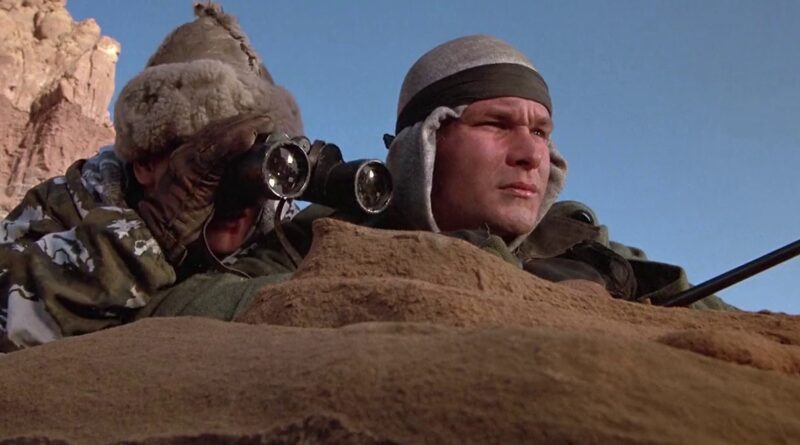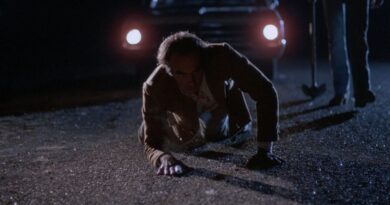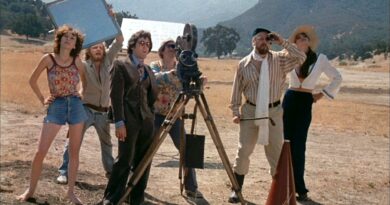Red Dawn (1984)
Red Dawn has got to be one of the stupidest movies of 1984. Do they honestly expect me to buy into the idea that a group of high school kids with no military training could actually become such skilled initiators of guerilla warfare? This movie does not have a single intelligent or meaningful argument to make about war; it exists primarily to glorify simplistic patriotic ideals, most of which is just rhetoric largely perpetuated by those who haven’t served their country militarily. This would include director/co-writer John Milius, who did attempt to enlist in the Marine Corp and volunteer for Vietnam but was rejected due to his health. I cannot begrudge him his fascination with the military or with guns; as they say, to each his own. But to channel those feelings into a war movie involving teen soldiers, some of whom aren’t even old enough to vote, is nothing short of appalling.
The film takes place in an alternate reality in which the United States has been politically alienated from the rest of the world. Several European unions, the U.K. exempted, have withdrawn from NATO. The Warsaw Pact has significantly expanded its influence over several far-reaching nations, and there has been a communist coup within Mexico, plunging the country into chaos. The United States is eventually invaded by Russia and its Latin American allies, specifically Cuba and Nicaragua, initiating World War III. We actually see this happen at a high school in a small town in Colorado, where the film takes place; during a history class, the teacher stops in mid sentence and watches in horror as Russian paratroopers land just outside the window. They immediately open fire, killing the teacher and several students.
Several other students escape and become the lead characters. These would be Jed Eckert (Patrick Swayze), his brother Matt (Charlie Sheen), and their friends Robert Morris (C. Thomas Howell), Daryl Bates (Darren Dalton), his brother Danny (Brad Savage), and Arturo Mondragon, nicknamed Aardvark (Doug Toby). After hastily equipping themselves with firearms provided by Robert’s father (Roy Jenson), they flee into the mountainside wilderness and for the next several weeks learn how to survive. One of them, and I forget who, is instructed by Jed and Matt to drink the blood of a deer he just shot, as they believe it makes you a “real hunter.” When the group finally returns to their occupied home town, Jed and Matt learn that their father has been captured and placed into a “re-education” camp. The boys will inevitably have a tearful goodbye with their father (Harry Dean Stanton) through a chain-link fence, at which point he orders them to avenge him.
The boys will eventually be joined by two young women, sisters Erica and Toni Mason (Lea Thompson and Jennifer Grey), and a downed U.S. Air Force pilot named Andrew Tanner (Powers Booth), who tells them that, although most of the country has been decimated and/or occupied, neither side will resort to the use of nuclear weapons. So apparently it’s not okay to depict a nuclear holocaust on film, and yet it’s perfectly acceptable to let teenagers form into a resistance movement and use machine guns and grenades – and, of course, to let many of them die in battle. The violence this movie depicts is not the fun, escapist stuff of comic book adaptations and teen slasher films; these kids are depicted as actually being shot and maimed as casualties of war. This would be fine if the intention was to speak out against it. But that isn’t the case. The actors are hapless tools for delivering militant pro-American propaganda.
Part of the problem is that this movie does not examine its hypothetical situation in a fair and balanced way. It’s all filtered through the American characters, who are innately biased. The Russians, the Nicaraguans, and the Cubans are little more than xenophobic typecasts, possessing little if any redeeming qualities that would allow us to consider them human beings. No matter who you root for in any conflict, a smart war movie will always look at both sides of an issue. It will challenge you to see things from the enemy’s viewpoint, even if you happen to disagree with it. It will not exploit young actors for the sake of an agenda or pander to anyone’s sense of blind patriotism. That kind of thinking is an insult to those who truly are serving our country with honor and distinction.
Perhaps it’s actually a good thing that, from a technical standpoint alone, the film is pretty bad. The performances by all the young actors are not especially convincing; had they been, I’d have to lament over the talent that was wasted. The score by Basil Poledouris, while certainly less insistent and annoying as that of Milius’ previous film Conan the Barbarian, is too reliant on electronic enhancements to adequately convey the patriotic tone. Had it been rousing and memorable, it would be superior music in an inferior movie. The dialogue conveys not development but posturing, as if everything had to be a pre-battle speech. Had I believed it, we probably wouldn’t be having this conversation right now. Red Dawn is a ridiculous and offensive exercise in sermonizing. The more I think about it, the more objectionable it becomes.




